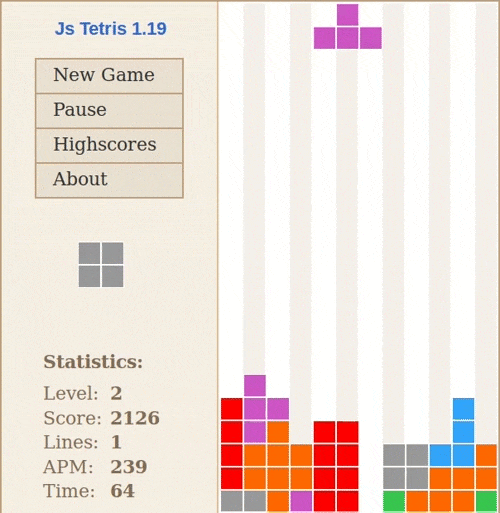Image created by Cezary Tomczak, Maxime Lorant [CC BY-SA 4.0 (https://creativecommons.org/licenses/by-sa/4.0)] (Source: Wikipedia Creative Commons Licence)
Post-traumatic stress disorder (PTSD) impacts people who have experienced extreme traumatic events such as war or torture. Sufferers are vulnerable to involuntary memories of traumatic events, colloquially called “flashbacks”, which are a distressing symptom of the condition. A recent study published in the Journal of Consulting and Clinical Psychology suggests a method that could reduce PTSD flashbacks through what the authors call ‘a visuospatial interference intervention’. This ‘visuospatial’ therapy is based on a rather unconventional idea—playing the computer game Tetris to alleviate flashback frequency.
Invented in 1980s Moscow, Tetris is a classic tile matching video game that involves slotting together various geometrical shapes called ‘Tetrominoes’ by moving them sideways and rotating them in order to form a horizontal line. When a line is formed, it disappears and more tetrominoes fall at an ever-increasing speed. The unusual link between PTSD and Tetris might seem puzzling at first glance, but it has been repeatedly proven in laboratory and clinical conditions.
The most recent study was led by Dr Aram Kehyayan and Professor Henrik Kessler from the LWL University Hospital Bochum, together with Professor Emily Holmes who studied Psychology at the University of Oxford. Their research involved 20 inpatients with complex PTSD, who received regular therapy for 6-8 weeks. The patients wrote a stressful memory down on paper, which they then tore up, and followed this by playing Tetris on a tablet device for 25 minutes.
The unusual link between PTSD and Tetris might seem puzzling at first glance, but it has been repeatedly proven in laboratory and clinical conditions.
The team found that the frequency of flashbacks decreased over time, and in the following weeks, other stressful events were targeted. Each time the number of involuntary memories dwindled. The study showed that Tetris reduced targeted flashbacks by around 64% and made a significant impact for 16 out of 20 patients; an astonishing result when one considers the impact this may have to PTSD sufferers.
Reducing flashbacks would have a fundamental impact to patients’ lives, as flashbacks are connected with ‘reliving’ trauma. This occurs when a person involuntarily undergoes the trauma again through vivid PTSD flashbacks as though they were experiencing the trauma again, leading to physical pain and sickness. Limiting the frequency of flashbacks therefore would cause fewer disruptions in the patients’ every-day life and lower their psychological and physical strain.
But how does Tetris mitigate flashbacks? Researchers believe that it is because the areas in the brain responsible for processing visual and spatial information are activated when patients visualise a stressful memory, and since Tetris puts high demands on this part of the brain, it interferes with the sensory recall of the traumatic memory. After trauma, the brain’s sensory channel is thought to overwhelm the conceptual one, which is responsible for comprehending sensory information. Thus, perhaps the brain’s competition for sensory resources can explain this surprizing link?
This study builds upon earlier research conducted by Professor Holmes. She discovered the connectivity between PTSD flashbacks and the palliative powers of Tetris in 2009 when she led an experiment where 40 healthy volunteers were shown traumatic material, and after 30 minutes, half of them played Tetris whereas the others did not. From this study, Holmes and her colleagues found that the volunteers who played Tetris had substantially fewer flashbacks than their peers.
The study showed that Tetris reduced targeted flashbacks by around 64% and made a significant impact for 16 out of 20 patients
2017 saw Professor Holmes and her colleague, Dr Lali Iyadurai, carry out a clinical experiment involving real patients who had undergone a traumatic vehicle accident. They suspected that patients who received the behavioural intervention while waiting in the emergency department would experience fewer intrusive memories. The study involved 71 victims; half of them recalled the trauma then played Tetris while they waited in the hospital, whereas the other half performed another task. The experiment was a great success —the Tetris group had fewer traumatic memories in total during the week immediately after the accident than the control group.
Flashbacks are a crippling feature of PTSD and should therefore be priority for treatment. The fact that this intervention does not use drugs is an added advantage as there has been controversy over the use of propranolol to ‘eradicate’ post-traumatic flashbacks. Similar to the protein-synthesis inhibitor anisomycin, which weakens fear memory for animals, the beta-blocker propranolol reduces physical responses to fear signals in humans. However, this could potentially be detrimental, as memory recall is important in situations such as legal procedures. The current data suggests that Tetris gameplay only ‘dampens’ flashbacks without leading to loss of the memory itself.
Research into PTSD is an area that, like many other mental health conditions, deserves more scientific understanding and public awareness. Even a decade after Professor Holmes brought our attention to the phenomenal, if bizarre, relation between PTSD and Tetris, there is still more work to be done on this innovative discovery.





